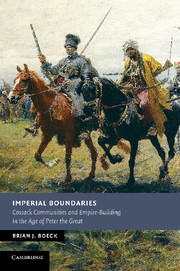Book contents
- Frontmatter
- Contents
- List of maps and illustrations
- Acknowledgments
- List of abbreviations
- 1 The Don region
- 2 The wider world of the Don steppe frontier
- Introduction
- 1 Beyond borders, between worlds: Russian Empire and the making of the Don steppe frontier
- 2 People and power on the frontier: liberty, diversity, and de-centralization in the Don region to 1700
- 3 A middle ground between autonomy and dependence: the raiding economy of the Don steppe frontier to 1700
- 4 Boundaries of integration or exclusion? Migration, mobility, and state sovereignty on the southern frontier to 1700
- 5 Testing the boundaries of imperial alliance: cooperation, negotiation and resistance in the era of Razin (1667–1681)
- 6 Between Rus' and Rossiia: realigning the boundaries of Cossack communities in a time of migration and transition (1681–1695)
- 7 The era of raskol: religion and rebellion (1681–1695)
- 8 Incorporation without integration: the Azov interlude (1695–1711)
- 9 From frontier to borderland: the demarcation of the steppe and the delegitimization of raiding (1696–1710)
- 10 Boundaries of land, liberty, and identity: making the Don region legible to imperial officials (1696–1706)
- 11 The Bulavin uprising: the last stand of the old steppe (1706–1709)
- 12 Reshaping the Don in the imperial image: power, privilege, and patronage in the post-Bulavin era (1708–1739)
- 13 Closing the Cossack community: recording and policing the boundaries of group identity (1708–1739)
- 14 A borderline state of mind: the closing of the Don steppe frontier (1708–1739)
- Afterword
- Index
- References
3 - A middle ground between autonomy and dependence: the raiding economy of the Don steppe frontier to 1700
Published online by Cambridge University Press: 12 January 2010
- Frontmatter
- Contents
- List of maps and illustrations
- Acknowledgments
- List of abbreviations
- 1 The Don region
- 2 The wider world of the Don steppe frontier
- Introduction
- 1 Beyond borders, between worlds: Russian Empire and the making of the Don steppe frontier
- 2 People and power on the frontier: liberty, diversity, and de-centralization in the Don region to 1700
- 3 A middle ground between autonomy and dependence: the raiding economy of the Don steppe frontier to 1700
- 4 Boundaries of integration or exclusion? Migration, mobility, and state sovereignty on the southern frontier to 1700
- 5 Testing the boundaries of imperial alliance: cooperation, negotiation and resistance in the era of Razin (1667–1681)
- 6 Between Rus' and Rossiia: realigning the boundaries of Cossack communities in a time of migration and transition (1681–1695)
- 7 The era of raskol: religion and rebellion (1681–1695)
- 8 Incorporation without integration: the Azov interlude (1695–1711)
- 9 From frontier to borderland: the demarcation of the steppe and the delegitimization of raiding (1696–1710)
- 10 Boundaries of land, liberty, and identity: making the Don region legible to imperial officials (1696–1706)
- 11 The Bulavin uprising: the last stand of the old steppe (1706–1709)
- 12 Reshaping the Don in the imperial image: power, privilege, and patronage in the post-Bulavin era (1708–1739)
- 13 Closing the Cossack community: recording and policing the boundaries of group identity (1708–1739)
- 14 A borderline state of mind: the closing of the Don steppe frontier (1708–1739)
- Afterword
- Index
- References
Summary
While the Don steppe frontier was no peaceable kingdom it was also no scene of incessant holy war. The raiding economy was calibrated towards equilibrium. Neither the Cossacks nor their nomadic Tatar adversaries were capable of eliminating each other from the face of the earth. They lived in cycles of aggressive and amicable symbiosis, exchanging goods and people under conditions of both war and peace. Although imperial affiliations could be important for local communities, especially for continued access to metropolitan markets and resources, on the ground allegiances and loyalties were ambiguous. The Cossacks were actors in an imperial drama, but government objectives often took second stage to local patterns of raiding, trading, and peacemaking.
The Don region was a middle ground in which the Slavic world receded into the Turkic world. “The middle ground,” Richard White has argued, “is the place in between: in between cultures, peoples, and in between empires.” The Don Cossacks constantly capitalized on their position as operators on the middle ground and derived their subsistence from the shifting boundaries between the Islamic and Christian worlds. While religious differences and imperial objectives legitimated raiding, local peacemaking defied religious dichotomies and forged patterns of common interest. Ransoming activities blurred boundaries between north and south: cross-cultural cooperation could move captive people across political jurisdictions from Moscow to the Caucasus. The Cossacks forged diplomatic deals and relationships of trust with both their Russian imperial patrons and their nomadic adversaries.
- Type
- Chapter
- Information
- Imperial BoundariesCossack Communities and Empire-Building in the Age of Peter the Great, pp. 40 - 53Publisher: Cambridge University PressPrint publication year: 2009



